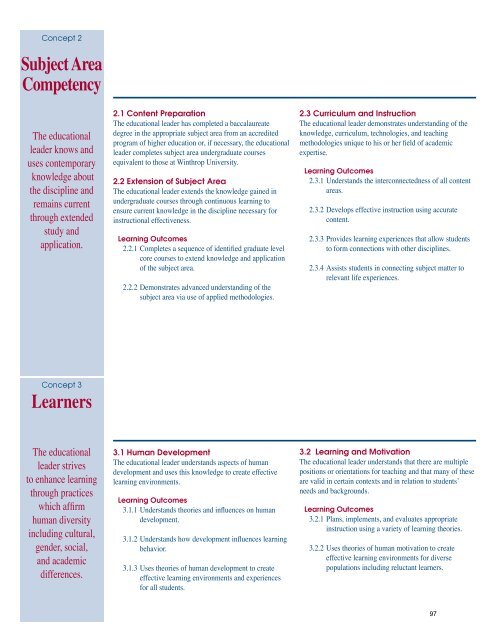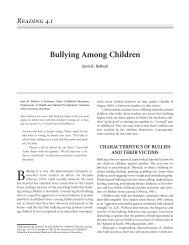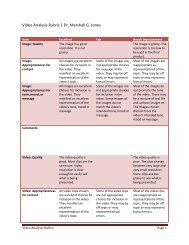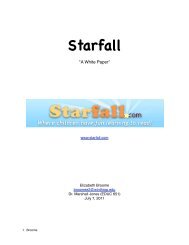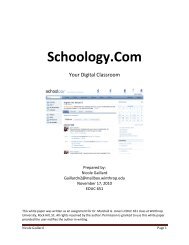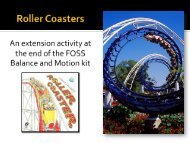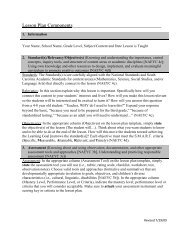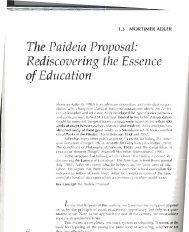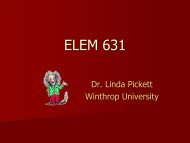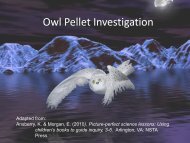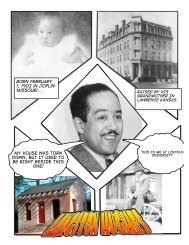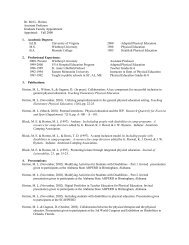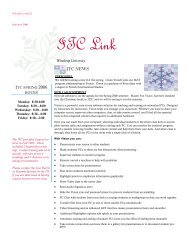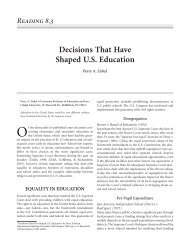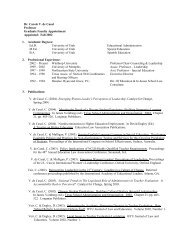2010-2011 Faculty Manual - College of Education - Winthrop ...
2010-2011 Faculty Manual - College of Education - Winthrop ...
2010-2011 Faculty Manual - College of Education - Winthrop ...
You also want an ePaper? Increase the reach of your titles
YUMPU automatically turns print PDFs into web optimized ePapers that Google loves.
Concept 2<br />
Subject Area<br />
Competency<br />
The educational<br />
leader knows and<br />
uses contemporary<br />
knowledge about<br />
the discipline and<br />
remains current<br />
through extended<br />
study and<br />
application.<br />
Concept 3<br />
Learners<br />
The educational<br />
leader strives<br />
to enhance learning<br />
through practices<br />
which affirm<br />
human diversity<br />
including cultural,<br />
gender, social,<br />
and academic<br />
differences.<br />
2.1 Content Preparation<br />
The educational leader has completed a baccalaureate<br />
degree in the appropriate subject area from an accredited<br />
program <strong>of</strong> higher education or, if necessary, the educational<br />
leader completes subject area undergraduate courses<br />
equivalent to those at <strong>Winthrop</strong> University.<br />
2.2 Extension <strong>of</strong> Subject Area<br />
The educational leader extends the knowledge gained in<br />
undergraduate courses through continuous learning to<br />
ensure current knowledge in the discipline necessary for<br />
instructional effectiveness.<br />
Learning Outcomes<br />
2.2.1 Completes a sequence <strong>of</strong> identified graduate level<br />
core courses to extend knowledge and application<br />
<strong>of</strong> the subject area.<br />
2.2.2 Demonstrates advanced understanding <strong>of</strong> the<br />
subject area via use <strong>of</strong> applied methodologies.<br />
3.1 Human Development<br />
The educational leader understands aspects <strong>of</strong> human<br />
development and uses this knowledge to create effective<br />
learning environments.<br />
Learning Outcomes<br />
3.1.1 Understands theories and influences on human<br />
development.<br />
3.1.2 Understands how development influences learning<br />
behavior.<br />
3.1.3 Uses theories <strong>of</strong> human development to create<br />
effective learning environments and experiences<br />
for all students.<br />
2.3 Curriculum and Instruction<br />
The educational leader demonstrates understanding <strong>of</strong> the<br />
knowledge, curriculum, technologies, and teaching<br />
methodologies unique to his or her field <strong>of</strong> academic<br />
expertise.<br />
Learning Outcomes<br />
2.3.1 Understands the interconnectedness <strong>of</strong> all content<br />
areas.<br />
2.3.2 Develops effective instruction using accurate<br />
content.<br />
2.3.3 Provides learning experiences that allow students<br />
to form connections with other disciplines.<br />
2.3.4 Assists students in connecting subject matter to<br />
relevant life experiences.<br />
3.2 Learning and Motivation<br />
The educational leader understands that there are multiple<br />
positions or orientations for teaching and that many <strong>of</strong> these<br />
are valid in certain contexts and in relation to students’<br />
needs and backgrounds.<br />
Learning Outcomes<br />
3.2.1 Plans, implements, and evaluates appropriate<br />
instruction using a variety <strong>of</strong> learning theories.<br />
3.2.2 Uses theories <strong>of</strong> human motivation to create<br />
effective learning environments for diverse<br />
populations including reluctant learners.<br />
97


